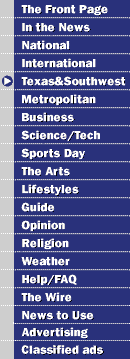|
10/01/93
Report plays star role at court hearing
By Victoria Loe / The Dallas Morning News
WACO -- The Treasury Department's censure of the failed raid at Mount Carmel was music to the ears of the Branch Davidians' defense attorneys. But the judge who will try the case wasn't singing along.
During a daylong hearing Thursday on various pretrial motions, the lawyers repeatedly cited the critique as evidence that the Bureau of Alcohol Tobacco and Firearms should bear the responsibility for the deaths of four agents and several sect members Feb. 28.
The raid's planners "engaged in a conspiracy to use excessive force" against the Branch Davidians, then mounted "a cover-up" after the raid failed, said Joe Turner, attorney for sect member Ruth Riddle.
Ms. Riddle and 10 other Branch Davidians have been indicted for allegedly conspiring to murder the four agents. A 12th defendant, Kathryn Schroeder, pleaded guilty to a lesser charge and will testify as a witness for the prosecution.
Mr. Turner and other defense attorneys are seeking access to an array of government documents pertaining to the raid, including the ATF's operational plan, which Treasury Department investigators found inadequate and which they said was altered after the failed operation.
U.S. District Judge Walter Smith took those and a number of other defense motions under advisement Thursday, but he served notice that he does not intend to let the defense put the ATF on trial.
"We're not going to try whether the government made a correct decision in this case," he warned Mr. Turner.
"We might as well fold up our tent and go away, if the judge won't let us attack the government," Steven Rosen joked after the hearing. Mr. Rosen is representing defendant Kevin Whitecliff.
Judge Smith showed little patience with the defense's more sweeping requests for information from prosecutors, chiding attorneys for going on "fishing expeditions."
In one of the few issues he ruled on Thursday, the judge postponed the trial from November to January. Discussing motions for a change of venue, he noted that Austin, which is favored by the defense, does not have a spare federal courtroom, while San Antonio, favored by the prosecution, does.
The 11 defendants looked on attentively, arrayed behind the defense table in identical orange prison-issue jumpsuits.
Their lawyers ranged themselves around a large, L-shaped table piled high with documents, a visible testament to the case's staggering complexity. The proceedings were punctuated by rueful references to the difficulty of coordinating the work of dozens of lawyers - few of them happy to play second fiddle.
"There are lots of egos," said Mr. Turner.
Defense attorneys argued that the ATF raid was illegal because
the agents failed to clearly announce their identity and their intention to serve a search warrant.
The first agent to reach the front door testified that as he ran toward the porch, he saw sect leader David Koresh standing at the open door and yelled to him, "Police, search warrant, lay down." He said Mr. Koresh, who did not appear to be armed, asked, "What's going on?"
The agent, Roland Ballesteros, said he then yelled again, "Search warrant, lay down."
Questioned by Jeff Kearney, attorney for defendant Jaime Castillo, Agent Ballesteros said he had "no doubt that (Mr. Koresh) knew who we were." However, he also said his assignment was not to announce the raiders' identity and request entrance but to enter the compound "by any means necessary."
Mr. Kearney argued that, because no specific provision was made in the raid plan for announcing the agents' identities and purpose, the government had always intended to storm the compound and take it by force.
He and others suggested that the agents may also have been quick to take the offensive because they knew they had lost the element of surprise.
"Would they have waited to be fired on?" asked Mr. Turner. He said the Treasury Department's finding that raid commanders rammed through a compromised operation "illustrates how much pressure the agents were ."
Mr. Turner also focused attention on Agent Ballesteros' statement to Texas Rangers, in which he said he heard gunfire before he reached the porch and assumed it was coming from ATF agents assigned to neutralize the sect's dogs.
Agent Ballesteros and prosecutor Ray Jahn declined Thursday to discuss any aspect of the case, including the Treasury Department analysis of the raid.
Several defense attorneys said they could not fully assess the usefulness of the Treasury Department report until they have studied it. But they said it will almost certainly prove useful in painting the raiders as trigger-happy and impeaching any testimony by the operation's planners.
"They screwed up," said Mr. Rosen. "That's the bottom line."
|


![]()



